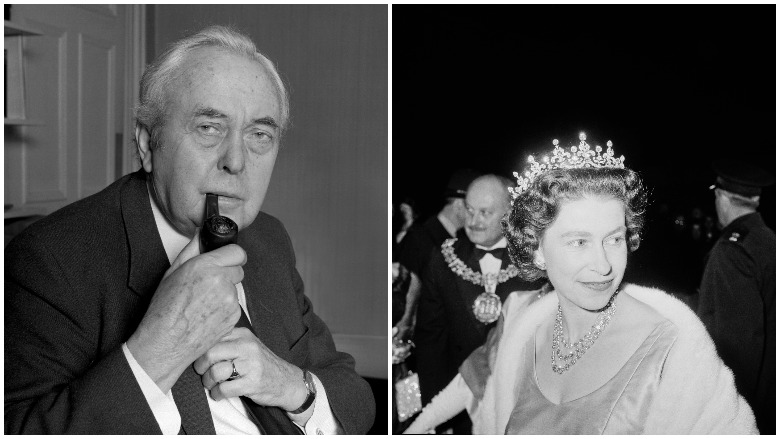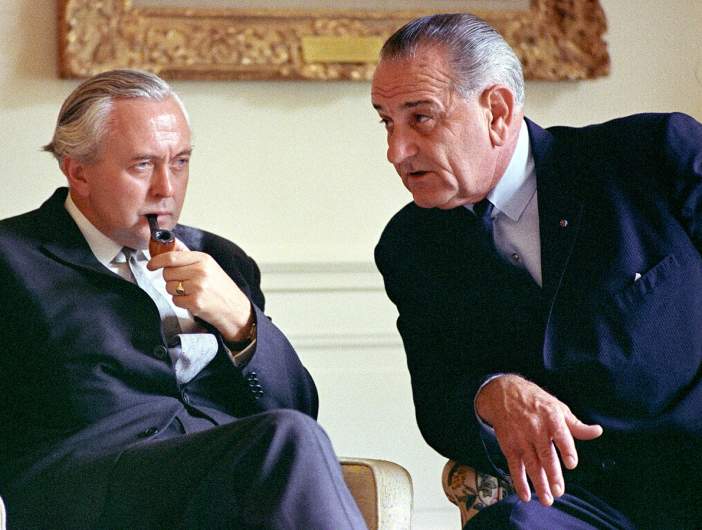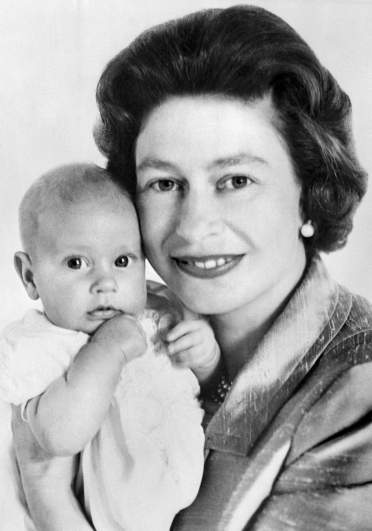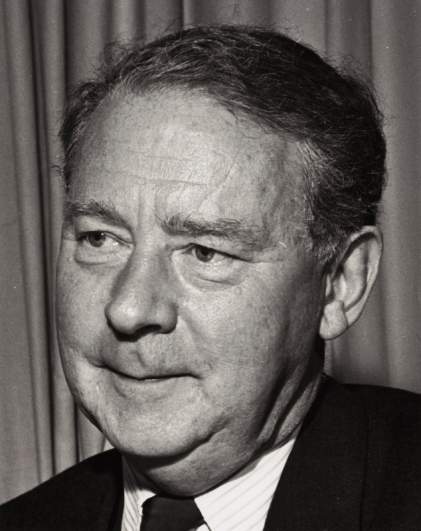
Wikimedia Commons/Getty Queen Elizabeth II (seen here in 1964) is suspicious that Prime Minister Harold Wilson (left) was a Russian spy, The Crown contends.
The Crown Season 3 starts with Queen Elizabeth II’s suspicions that the new British Prime Minister, Harold Wilson, might be a Russian spy. (Warning: There will be spoilers for The Crown, Season 3, episode 1 in this article.)
In the first episode of the new season, which streamed on Netflix on November 17, 2019, Queen Elizabeth II (played now by Olivia Colman) grows suspicious that Wilson is a mole. Sir Winston Churchill is ailing and then dead, there’s a new government in place, it’s the height of Communism fears, and Prince Philip (Tobias Menzies) stokes the Queen’s worries with an offhand comment about Wilson conspiracy theories that he’s picked up at lunch.
By the end of the episode, MI5’s director douses the Queen’s suspicions, saying that, although there were clearly attempts by the KGB to recruit Wilson while he was on trade missions to that country, the evidence was weak that they succeeded. This seems to pacify the now middle-aged Queen, who approaches Wilson at an art exhibit to apologize for misjudging him.
It turns out that it’s Buckingham Palace that has the Russian mole in its midst, a member of the Queen’s household no less, Sir Anthony Blunt, her surveyor of pictures (that story is true: Blunt, also a distant cousin of the Queen’s, was recruited to be a Russian spy while studying at Cambridge and passed information to Russian handlers. He was part of a spy ring known as the Cambridge Five.) Yet, MI5 asks the Queen to do nothing about Blunt because exposing the mole will embarrass the British intelligence services and hamper fraying relationships with the Americans.
However, was Harold Wilson a Russian spy? What was the evidence? And how did his predecessor really die? (The Queen hears a rumor that he was poisoned but MI5 doesn’t believe that’s true, either.)
Here’s what you need to know about the real story:
British Intelligence Kept a Secret File on Wilson Because They Were Worried About His Contacts With the KGB

Harold Wilson with President Lyndon B. Johnson
Harold Wilson was a real person. He was Britain’s Labour Prime Minister four times, serving from 1964 through 1970 and then again from 1974 through 1976. He replaced Hugh Gaitskell, who died suddenly in 1963 (in The Crown, the Queen also hears a conspiracy theory that Gaitskell was poisoned to make way for Wilson). Wilson died at age 79 in 1995.
In 2009, a book was published called Defence of the Realm. It was the first authorized history of MI5, and it revealed that the British intelligence service did in fact keep a “file” on Wilson while he was PM, according to BBC. No other PM had such a file, the book states, and it was kept so secret that it was filed under a fake name, Norman John Worthington.
According to BBC, the concerns focused on Wilson’s “relationships with Eastern European businessmen” and his “contact with KGB officers.”
Mail on Sunday reported that the intelligence services were bugging Wilson by installing listening devices in “No10 – the Cabinet Room, the Waiting Room and the Prime Minister’s study.” Wilson suspected he was being bugged and created the Wilson Doctrine outlawing such bugging. He believed he was the target of right-wing intelligence officers.
BBC reported that, as Wilson saw it, he was the victim of an orchestrated military coup backed by the Royal Family.

GettyThe Queen Elizabeth II poses with Prince Edward, 13 June 1964 in London.
Then BBC journalist Barrie Penrose told the Radio Times that the paranoia needed to be considered in the context of the era, saying, “Our establishment, from the intelligence services down to parts of Fleet Street, were paranoid about the threat of communism. So paranoid it seems, they were prepared to believe a prime minister of Britain was an active Soviet spy.”
But was he?
The Russian attempts to turn Wilson are pretty well-documented. According to Radio Times, in the 1990s, newly released KGB documents known as the Vasili Mitrokhin archives, showed that Soviet intelligence services had an “agent development file” on Wilson, codenaming him OLDING in 1956.
The book The Mitrokhin Archive explained: “The most important British politician identified in the files noted by Mitrokhin as a target for KGB recruitment was Harold Wilson. Given the extent of his contacts with the Soviet Union, unusual for a Western politician in the early years of the Cold War, Wilson was an almost inevitable target.”

Wikimedia CommonsHugh Gaitskell
That book’s Amazon description says of Mitrokhin: “For years KGB operative Vasili Mitrokhin risked his life hiding top-secret material from Russian secret service archives beneath his family dacha. When he was exfiltrated to the West he took with him what the FBI called ‘the most complete and extensive intelligence ever received from any source.'”
But, and this is key, the Mitrokhin files also indicate that the Soviet attempts to recruit Wilson “did not come to fruition.”
However, also sparking the conspiracy theories about Wilson: Soviet defector Anatoliy Golitsyn claimed Wilson was a KGB agent, according to Express.
In 1987, a former M15 officer named Peter Wright wrote a book called Spycatcher in which he alleged that a top CIA official, James Angleton, had told him that Wilson was a Soviet agent, Express reports. According to Telegraph, Golitsyn claimed that Gaitskell was assassinated by the Soviets to make way for Wilson.
However, after years of investigations and rumors, MI5 officially concluded that Wilson was not a Soviet spy, Telegraph reported. The Sunday Times reported that Wilson was a leading figure of British socialism who attended meetings with Soviet agents but wasn’t a spy himself.
According to Spartacus International, Golitsyn was assigned to the Soviet embassy in Finland under the name “Ivan Klimov” when he “walked into the American embassy and asked for political asylum.” He was granted it, and flown to a safe house near Washington D.C.
The site reports that CIA officers found Golitsyn “unpleasant and egotistical” and “almost too fortunate and too high up to have a reason to defect.” He demanded to speak with Angleton, who believed him even though others did not. The doubters felt Golitsyn was still doing the bidding of the Soviets by confusing and lying to his new benefactors.
“Golitsyn claimed that Hugh Gaitskell had been murdered in January 1963 to allow Harold Wilson, a KGB agent, to become leader of the Labour Party,” Spartacus International reported, writing that “Angleton believed Golitsyn but few senior members of the CIA agreed with him. They pointed out that Gaitskell had died after Golitsyn had left the Soviet Union and would have had to know in advance what was about to take place.”
Thus, the question of whether Wilson was a spy (or the target of a coup) depends on whom you believe and has never been definitely proven.
According to his IMDB profile, Harold Wilson graduated from Oxford University and became an economics lecturer, eventually representing Huyton in Parliament and becoming president of the Board of Trade.
READ NEXT: Prince Philip’s Retirement.